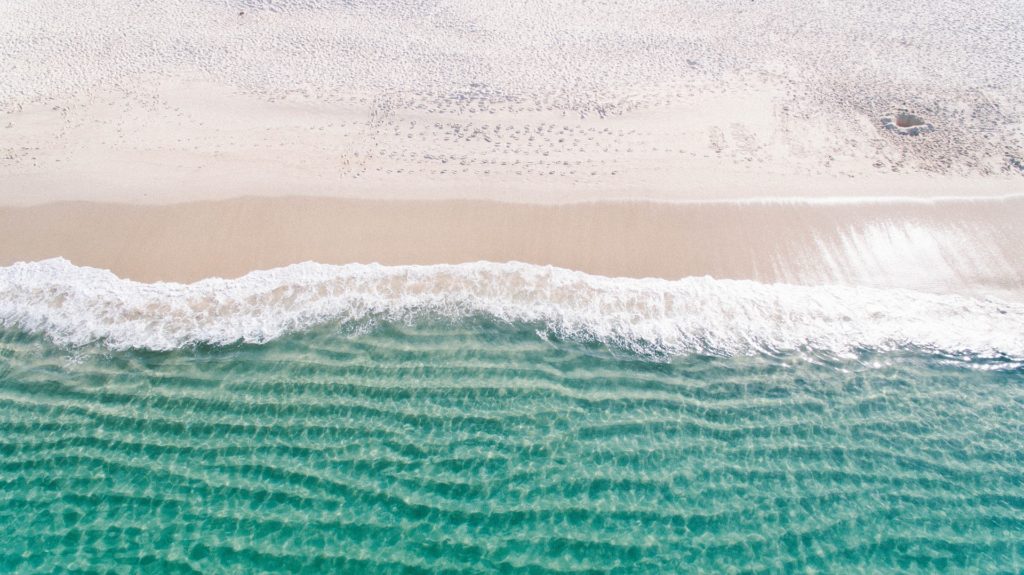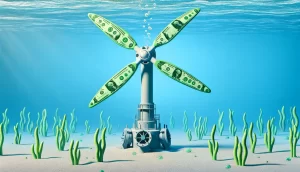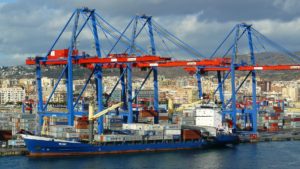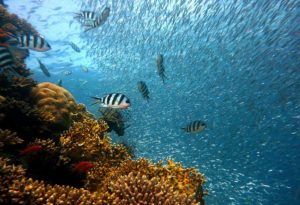The investment world is starting to realize the financial opportunities that exist in the ocean. In this installment of Blue Tech Voices I interviewed Sverre Martinsen, partner and co-founder of Fynd Ocean Ventures, a new impact investment fund management group that is targeting Series A investments in ocean technology startups. Fynd is in the process of fundraising for their first fund and I spoke with Sverre in March 2021 about their investment thesis and their plans for the future.
The Liquid Grid [TLG]: Fynd Ocean Ventures is one of the first dedicated venture capital funds for ocean tech. Can you tell us a bit about your investment thesis? What led to its creation?
[FOV]: Depends on how you define it, but the space we are in is the intersection of Series A funding with ocean technology. I wouldn’t say we are the only group in this space, there are quite a few players now, and we try to distinguish ourselves through our specific focus on growth companies related to aquaculture and new materials from the ocean. The ocean is very important for the world over the coming decades, so the long-term macro trend is that this space looks very positive and this outlook is giving many ocean sectors a tailwind for growth. That goes for multiple ocean sectors whether it’s maritime, energy aquaculture, fisheries, or other ocean related sectors.
My co-founder Maren came from Katapult Ocean which is an ocean technology accelerator and she realized that while there were companies coming into and graduating from the program, there were few investors to support startups in the next phase of their journey. Of course there are always the generalist funds, but there aren’t many sector specific investment funds for ocean growth companies. So we built Fynd’s investment thesis around investing in ocean related tech ventures that need domain expertise to help them grow.

[TLG]: It looks like Fynd focuses investment in fisheries and aquaculture, materials, and ocean data. Why these? Does Fynd invest in other sectors of the blue economy like maritime transport and offshore renewable energy?
[FOV]: We have condensed into two verticals: smart sustainable aquaculture and what we call ocean materials. There is some overlap between these two but generally the former is more about seafood and the latter relates to plant based materials that include micro and macroalgae, and not just for seafood, but other products such as bioplastics, textiles, cosmetics pharmaceuticals. Looking at just those two verticals we are planning to do three to four investments per year. In terms of investment amounts, we are currently fundraising and our ambition is to raise $50 million or more for this first fund. We are likely to invest in 10 or more companies over the life of the fund, or around $5 million on average for each company. At the moment I would say a lot of ocean technologies are of interest, but we are currently not active in maritime shipping or energy.
[TLG]: Can you elaborate why you’re not focused on ocean energy or maritime?
That’s a good question and I think we should distinguish between Fynd the fund manager and our first fund that we’re raising money for right now. Our ambitions are to become a global fund manager within the ocean space, but we’ll do that through multiple funds. As we get started we want to ensure that we have a sufficient reach, but that we also don’t overextend ourselves in the first round. One of the main reasons we have narrowed in on these two verticals is due to the expertise and background of our team and our advisors. As we grow we may broaden out into other verticals, but maritime shipping and energy are probably a little ways off for us at the moment. Our next funds would be more likely to focus on ocean sectors similar to these first two verticals, perhaps capture fisheries for example.
[TLG]: How does Fynd Ocean Ventures find startups to work with? I know you have a strong relationship with Katapult Ocean, but do you work with other international partners such as incubators and accelerators?
[FOV]: We spend a lot of time working on building networks to find promising investments, not just locally but globally as well. We work with the larger corporate world, academia, other funds, startup accelerators and incubators, etc. These are generally the main source of potential investments that we come across. We do like to work with incubators and accelerators quite a bit, of course we have a relationship with Katapult Ocean, but there other groups out there we like to work with as well such as Aquaspark or S2G Ventures in the U.S. From my perspective coming into this sector relatively recently there appears to be a strong interest within all these groups to build-up the ecosystem.
We only started working on Fynd a few months ago and we already have 300-400 companies from across the globe that we’ve been reviewing just within our two verticals of interest. About three-quarters of them are in Europe, but we do see interest across the globe. We obviously aren’t tracking every single company and the industry is not super mature, but at the same time it’s fairly small which makes it easier to keep track of what’s going on. Given that, it seems like we have a steady pipeline of companies to choose from.
[TLG]: I understand that the word ‘Fynd’ is an old Norse word for impact. How do you measure your impact in the blue economy?
[FOV]: These days everyone is talking about the impact, and they should be it’s very important. For us, we want to see financial impact as well as a broader positive sustainability impact in the world. Of course financial impacts are important and we won’t be competitive with any other fund if we don’t keep an eye towards that, but at the same time we want to have a very active role in driving positive change. We are looking to established frameworks that exist in the blue economy for guidance, such as the sustainable development goals (SDGs), specifically for life underwater or feeding the world. The simple answer is that we want to demonstrate positive impacts in the world that tie back to back to established frameworks like the SDGs, but that we’ll also be creating company-specific KPIs, so each startup investment will be measured in slightly different ways most likely. Keep in mind we are still fundraising at the moment and we haven’t made any investments yet, so this is all under development.
[TLG]: You mentioned that focus mostly within Europe, but do work globally, can you comment on some of the drivers you see in aquaculture and materials?
[FOV]: So we do focus locally in Europe at the moment, but again that’s largely due to limited reach and so it’s natural for us to start a little bit closer to home but we see a lot of interesting stuff happening globally with regards to aquaculture, whether its related to operations, data analytics, etc. Let me give you a few different angles: one of the big drivers we see at the moment in aquaculture is a shift to land-based systems, such as recirculating aquaculture systems (RAS). Shoreside production creates some interesting opportunities for moving the production site closer to the consumer, cutting down on supply chain problems and costs. Third, data analytics has made aquaculture more globalized.
We’re seeing a lot more companies looking to do business here in Norway that come from the West Coast of the US or the East Coast of Canada that are really focused on how to use data to optimize aquaculture operations. In the materials space, I’m really interested in the potential of microalgae. I think there is a lot of promise in the technology that can be used for microalgae production, and then on how to use the product for other sectors beyond just food, like textiles or pharmaceuticals.
[TLG]: I haven’t heard you mention cellular aquaculture yet, any thoughts there?
[FOV]: We see great promise, just look at the land-based side with cell-based meat, there is no reason why cellular aquaculture should not follow that trajectory. We think it’s still in very early stages, but it’s going to be super interesting to follow. We also see plant-based seafood just as interesting as cell-based while we’re on the subject.
[TLG]: The Liquid Grid has lots of entrepreneurial readers, how can they, and other marine technology startups, get on Fynd Ocean Ventures’ radar?
[FOV]: Best way to get in touch is to drop us a note through our website or through the email: [email protected] We are open to unsolicited pitches or however entrepreneurs want to sell themselves. We of course like to attend ocean related industries gatherings as well, so look for us at those if you want to connect in person.

Sverre is Founder & General Partner at Fynd Ocean Ventures. He is passionate about the venture capital world, and he has been an active VC investor privately for several years. Before Fynd, Sverre was a Managing Director & Partner at Boston Consulting Group.




